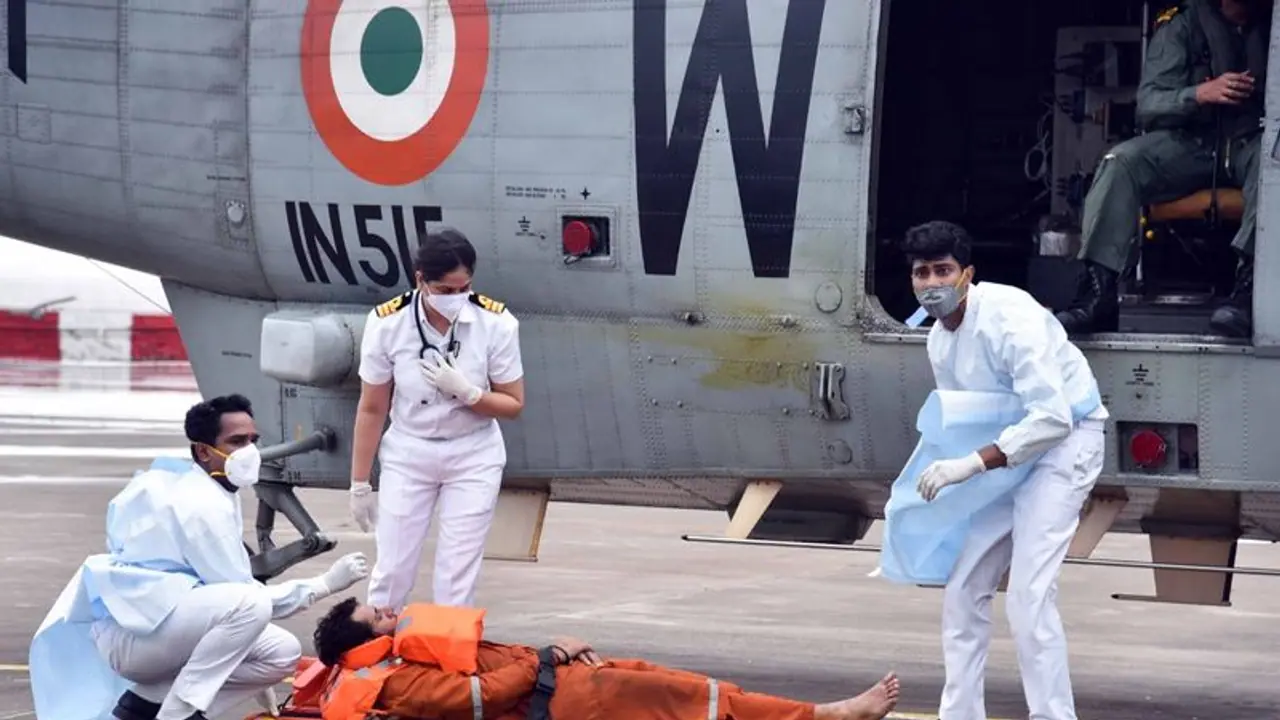While the government and ONGC say that weather warnings had been given, Afcons holds Durmast and P305 Master for not moving far enough.
With 24 crew members on board Barge P305 still missing, the Indian Navy, Indian Coast Guard ships and ONGC's vessels are working hard to find the missing men in choppy waters.

As hopes of finding more survivors recede, the question arises about who should be held accountable for the tragedy.
The central government has already set the record straight and reiterated that appropriate action was taken following warnings about the approaching cyclone Tauktae.
"Based on the weather warnings, ONGC activated its emergency response system and issued instructions to all installations to take action as per the standard operating procedure. Complying the same, appropriate actions including staying at the safe mode or returning to the safe locations to the anchoring points were taken by the respective installations," a government source said.
There were 7675 personnel working on 342 ONGC installations that include drillships and barges. Approximately 6961 personnel stayed safe at sea or shore before cyclone impact.
Out of the 342 installations, 243 were fixed, while the remaining 99 were floating decks. Amongst the floating installations, 94 were remained safe at appropriate locations at sea and shore. Five floating installations, which had a total of 714 personnel onboard, bore the brunt of the cyclone.
Out of 714, 628 have been rescued while the mortal remains of 51 crew were recovered.
State-owned ONGC has drawn flak from different quarters of society for not following the advisory issued by the Indian Coast Guard regarding the arrival of Cyclone Tauktae in the Arabian Sea.
On Friday, an FIR was registered against Barge P305 Captain Rakesh Ballav and others for putting the lives of workers in danger during the cyclone. They were booked under 304(2), 338, 34 of the Indian Penal Code at Yellowgate Police Station based on the complaint lodged by the barge engineer of P305.
ONGC, meanwhile, said that it had ordered the operations be suspended and all platforms to be left in 'Sea Survival Mode' and personnel to move to safety and away from installations on May 13.
It also said that the cyclone changed its path and exceed in wind speed which turned out to be deadly for the Barge P305.
ONGC had given the contract to Afcons Infrastructure Limited for revamping its unmanned offshore platforms in the Arabian Sea. AFCONS gave the sub-contract to Durshmat enterprises, which owned and operated the P305 barge.
On Thursday, Afcons Infrastructure Limited issued a statement and said that the weather forecast on May 14 predicted a sustained wind speed of a maximum of 40 knots (classified as a 'Tropical Storm' by our service provider) at its specific work location late May 16 or early May 17.
It said that precautionary measures were taken after receiving the alert.
Afcons said that on May 14 itself, all its vessels were told to secure their respective work locations and move to safe locations immediately.
Afcons further said that while other barges moved to Mumbai Port, Mumbai Outer anchorage and the anchorage close to Revandanda, the P305 Master moved just 200 metres away from the HT platform where the barge was operating.
He remained at that location, deciding that it was a safe location on the assumption that the maximum predicted wind speed was only 40 Knots and his location was 120 NM away from the eye of the tropical storm, Afcons claimed.
However, the weather conditions deteriorated rapidly from the evening of May 16 -- reaching levels far worse than predicted on May 17, Afcons said, adding that the sudden weather deterioration left no time for any further action to be taken by the P305 Master.
Citing normal marine protocol and the specific charter agreement for P305, Afcons said that matters related to vessel safety come under the responsibility of the owner or Barge Master.
On why people were not evacuated post the alert, the company said that evacuation of the vessel is an extreme step only resorted to in case the vessel is in distress.
Currently, the Indian Navy's six ships, including INS Kochi, INS Kolkata, INS Talwar, INS Beas, INS Betwa and INS Teg, are involved in the joint search and rescue operations.
Besides, the Indian Coast Guard's five vessels, including ICG Samarth, ICG 206, CG Patrol and ICG Shoor, are also part of the operations. ONGC, too, has also deployed 20 vessels while Afcons has pressed in one vessel in operation.
For the aerial survey, a total of 15 helicopters have been engaged.
